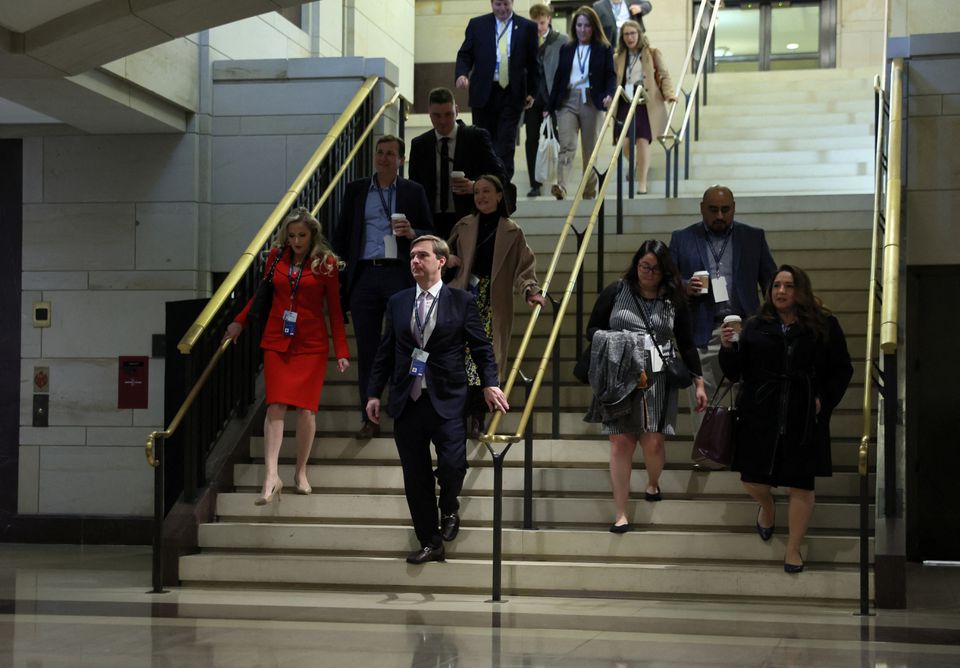WASHINGTON (Reuters) – Democrats in the U.S. Congress aim to pass bills protecting same-sex marriage, clarifying lawmakers’ role in certifying presidential elections and raising the nation’s debt ceiling when they return from the campaign trail on Monday.
President Joe Biden’s party got a boost over the weekend when it learned it would keep control of the Senate for the next two years, while control of the House of Representatives is still up in the air as votes are counted after Tuesday’s midterm election.
But Democrats escaped a feared midterm drubbing and will look to make the most they can of their current thin majorities in both chambers before the new Congress is sworn in on Jan. 3, a period known as the ‘lame duck’ session.
House Speaker Nancy Pelosi and Treasury Secretary Janet Yellen both signaled that addressing the nations’ looming debt ceiling would be a priority during the session.
Some Republicans have threatened to use the next hike in the $31.4 trillion debt ceiling, expected in the first quarter of 2023, as leverage to force concessions from Biden. Yellen in a Saturday interview with Reuters warned that a failure to act would pose a “huge threat” to America’s credit rating and the functioning of financial markets.
Pelosi, who would lose her position as speaker if Republicans win a majority in the House, told ABC News on Sunday that the best way to address the debt ceiling was “to do it now.”
“My hope would be that we could get it done in the lame duck,” Pelosi said. “We’ll have to, again, lift the debt ceiling so that the full faith and credit of the United States is respected.”
Biden told reporters over the weekend he would wait to speak to Republican leadership before deciding any priorities, adding he planned to “take it slow.”
Congress has a long to-do list in the coming weeks. It faces a Dec. 16 deadline to passing either a temporary funding bill to keep government agencies operating at full steam until early next year, or a measure that keeps the lights on through Sept. 30, the end of the current fiscal year. Failure to enact one of those would result in partial government shutdowns.
The House already has passed legislation legalizing gay marriage and the Senate was poised, as soon as this week, to approve its slightly different version of the “Respect for Marriage Act.” The bill is intended to ensure that the U.S. Supreme Court does not end gay marriage rights, which conservative Justice Clarence Thomas mused was possible when the court in June ended the national right to abortion.
Another high-priority item is a bipartisan bill reforming the way Congress certifies presidential elections, intended to avoid a repeat of the violence of the Jan. 6, 2021, assault on the Capitol by supporters of former President Donald Trump who wanted to stop lawmakers from certifying Biden’s win.
Democratic leaders also aim to pass legislation speeding permits for energy projects and provide more financial and military support for Ukraine in its fight against Russia’s invasion.
Some Republicans have expressed reluctance to provide more financial support for Ukraine.
Progressive Democrats have bridled at the prospect of the government stepping up the energy permitting process, thus encouraging the flow of fossil fuels to market even as Biden attempts to meet stringent goals to reduce the impact of climate change.
Biden has suggested permitting reform could be included in the National Defense Authorization Act, the annual bill funding the military that usually gets strong bipartisan support.
But keeping the Senate majority for the next two years means that there will be less pressure on Senate Majority Leader Chuck Schumer to confirm as many of Biden’s nominees for federal judgeships as possible before the end of the year.
There are 57 judicial nominees pending before the Senate, with 25 already approved by the Judiciary Committee and awaiting action by the full chamber.
The Senate has already confirmed 84 of Biden’s judicial nominees, allowing him to essentially keep pace with the near-record number of appointments Trump made during four years as he worked to move the judiciary rightward.

